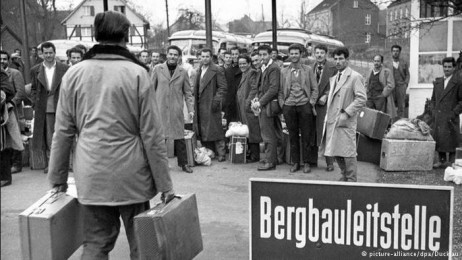New Zealanders: Australia's Gastarbeiter?

01 August 2013
Stephen Jeffery - Oz Kiwi
During the late 1950s and 1960s West Germany had bilateral recruitment agreements in place with a number of European countries; Italy, Greece, and Turkey amongst others. These agreements allowed 'Gasterbeiter', literally 'Guest Workers', to live and work in Germany in response to a labour shortage prompted by economic recovery following World War II. The perception was that working in Germany would only be temporary and after a period of 1 or 2 years temporary migrants would return home and make way for others. Many did this. However, by the time the economy finally began to contract, many of the Gasterbeiter had lived in Germany for a decade or more. For some there were relatively few jobs to return 'home' to and many stayed in Germany.
As economic conditions declined the Gasterbeiter program was suspended in 1973. By the late 1970s and 1980s a growing number of children were being born to this foreign population in Germany. Unlike in the United States and elsewhere, these children were not granted citizenship at birth and they too were treated as foreigners.
The Gasterbeiter were not automatically granted citizenship in Germany, but instead the 'right to reside'. They were granted many rights in Germany, including access to education, healthcare, welfare and housing assistance, but there were limitations. They could not vote in certain elections or hold jobs that required German Citizenship, for example those of police officer, school teacher, or soldier.
In 1991 a new Aliens Act was introduced allowing the Gasterbeiter to become citizens for the first time. In 2000 the new Staatsangehoerigkeitsgesetz (STAG) came into force. Since then German law has applied both the jus sanguinis (citizenship by descent) and the jus soli (citizenship by place of birth). Children of foreign parents become entitled to German citizenship as well as the citizenship of their parents.
For Kiwis in Australia there are many parallels. Although New Zealanders have the right to live and work in Australia, since the introduction of the Howard Government reforms in 2001 New Zealanders who move to Australia have been effectively reduced to an underclass with fewer rights than the Gastarbeiter.
Now that many of us have been living in Australia for more than a decade, it is time for the Australian Government to recognise that, without citizenship, New Zealanders who have made their home here will begin to feel ostracised. Without citizenship we are disenfranchised. Our children often have little option but to return to New Zealand for tertiary education, splitting families and sending our youth to a country they barely know. Others instead accept unskilled low paying jobs. More and more fall through the cracks completely and without any social safety net may end up homeless.
Surely, if Germany could recognise the social consequences of excluding a section of society from citizenship 22 years ago, then Australia in 2013 can too?